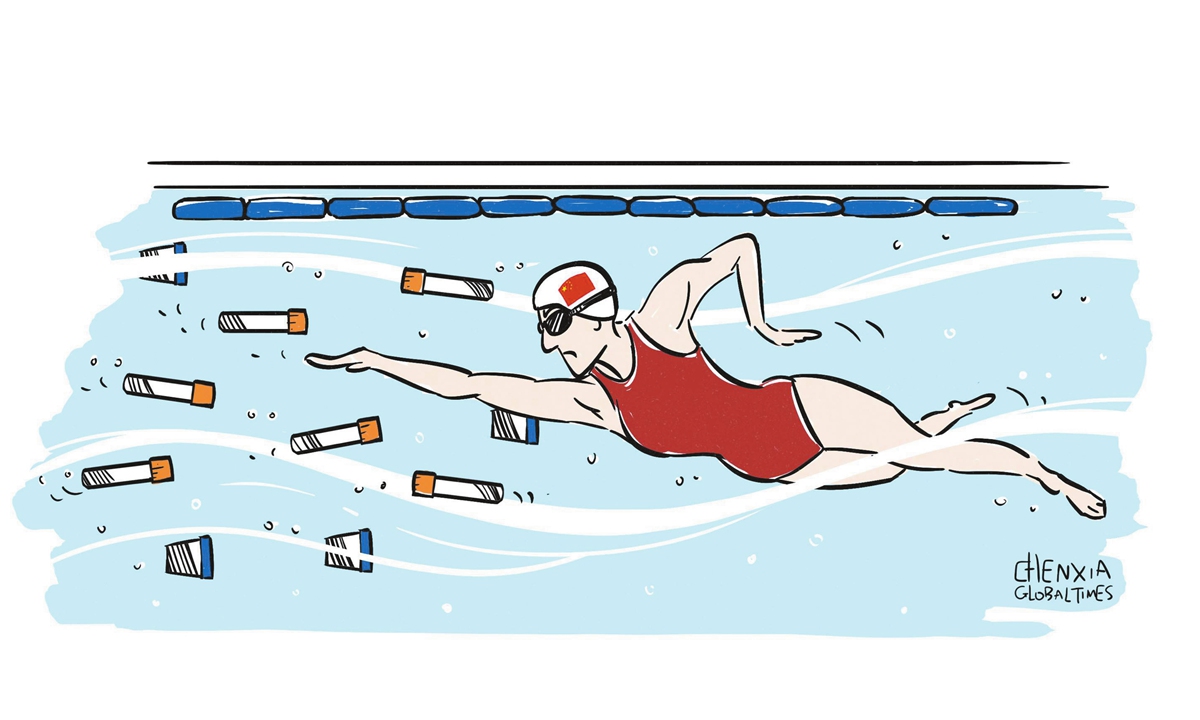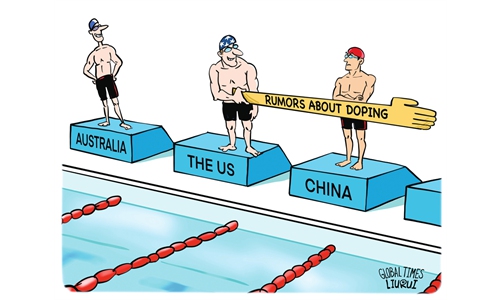
Illustration: Chen Xia/GT
Chinese butterfly queen Zhang Yufei, a two-time world champion, was hoping to reclaim her title at the Olympic pool in Paris on Sunday. It did not come to be. In the women's 100-meter butterfly, she finished in third place. Despite this outcome, Chinese fans are still greatly proud of her.
We are proud because this medal was won amid intense Western scrutiny, crazy smears, rigorous and excessive doping tests, and the fact that the US Justice Department has even opened a criminal probe into an alleged sports doping scandal involving nearly two dozen elite Chinese swimmers.
Facing enormous pressure and a horrible Western media attack, this young lady withstood the stress and clinched the bronze medal. She kept a warm smile for the cameras throughout. It was only when she passed by the Chinese spectators that her eyes began to shimmer with tears.
Zhang displayed grace in her post-race interview. She didn't blame anything — she made no mention of the pool's depth or complain about the frequent testing. After objectively analyzing her performance, Zhang extended a competitive invitation to her American competitors: "This time, I didn't adjust well. I look forward to the next world championship where I hope to compete at my best and enjoy the race. I still believe that my 100m butterfly will give the world record holder a run!"
However, we cannot ignore the underlying factors affecting athletes' performances: the media warfare, unfair testing frequency, and the high ratio of exemptions for certain medications in the US.
World Aquatics noted in a statement last week that including tests conducted by other anti-doping organizations, aquatics athletes competing in Paris have been tested an average of 3.4 times, while Chinese swimmers have been tested on average 21 times since January 1 2024. Even quite a few Western media outlets acknowledge that China's best swimmers are being targeted by drug testers more than any other country in the lead-up to the Paris Olympics. But they take it for granted.
That is arrogant and spiteful. Now, "the doping tests apparently disrupted the Chinese swimming team's pre-competition training, which is a disgrace to the Olympics," Shen Yi, a professor at Fudan University, told the Global Times.
The Chinese swimming team is competing clean. In April, the World Anti-Doping Agency (WADA) confirmed that Chinese swimmers were cleared to compete at the Tokyo Games. Earlier in July, WADA said it was disappointed to learn that the US Department of Justice is investigating the 2021 contamination case of 23 swimmers in China. "WADA reviewed the Chinese swimmer case file diligently, consulted with scientific and legal experts, and ultimately determined that it was in no position to challenge the contamination scenario, such that an appeal was not warranted," the agency said in a statement.
On the other hand, it is time for Chinese media and relevant authorities to investigate why so many athletes in the US swim team appear to be ill and require long-term medication. What is the number of these people and should that be taken as a given?
The US Anti-Doping Agency has been repeatedly reminding athletes to apply for Therapeutic Use Exemption (TUE) when needed. Such exemptions are intended for athletes who have fallen ill. The WADA official website stipulates that a TUE ensures that athletes can be treated for medical conditions - even if the treatment involves using a prohibited substance or method - while avoiding the risk of being sanctioned. This is normal. But reports show that the US appears to lead world in approved TUEs. If the number is too high, it should no longer be considered normal.
We do hope to enhance fairness in the Olympics.
Due to privacy protection, the specific list of athletes with TUEs is not disclosed. However, observers are asking if organizers of major events such as the Olympic Games could publish the percentage of athletes from each country who have received exemptions. For example, what percentage of Chinese athletes have TUEs compared to American athletes? And what percentage of medalists have TUEs? If there is no official data available, efforts should be made to gather fragmented information and determine how much of the so-called sports powerhouse America is supported by doping.
Don't say that Chinese people care too much about gold medals or that they are not relaxed enough. Western media outlets, especially from the US, have no right to demand that China stay calm in the face of their smears and unfair treatment. The Olympic motto is "Faster, Higher, Stronger - Together." But for Chinese swimmers, they urgently need one more: "Fairer."
The abuse of doping tests to disrupt the Olympics reflects the rule-based liberal international order dominated by the US. Olympic competitions have always been closely tied to great power rivalries, which is now an undeniable fact. When US manipulates the rules - through relentless and unethical testing - to thoroughly disrupt the Chinese team's preparation and training, thereby ensuring a victory, this is a classic example of American hegemony. "Yes, it sounds like a conspiracy theory, but the objective facts make it hard not to believe in such theory," Shen said.
In this context, Chinese people have a special fondness and admiration for Zhang. After the competition, she said, suffering or torment, happiness or sadness, and tension are all part of the competition. She acknowledged her loss but did not give up.
In the face of unfairness, the kind-hearted Chinese athletes make people feel heart-wrenching. This is not right. This needs to change. Athletes deserve protection and a fair environment in which to compete.
The author is a reporter with Global Times. opinion@globaltimes.com.cn

